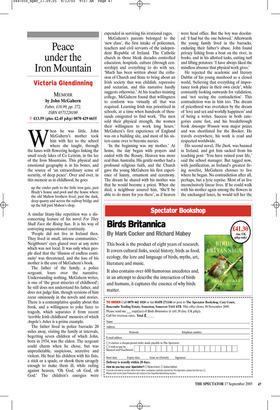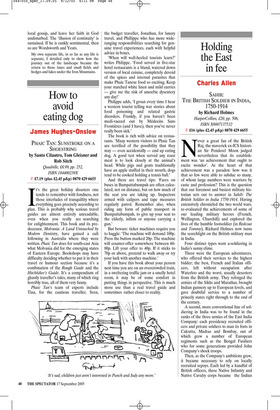Peace under the Iron Mountain
Victoria Glendinning
MEMOIR by John McGahern Faber, £16.99, pp. 272, ISBN 0571228100 ✆ £13.59 (plus £2.45 p&p) 0870 429 6655 When he was little, John McGahern’s mother took him with her to the school where she taught, through the lanes with flowering hedges linking the small reedy lakes of Co Leitrim, in the lee of the Iron Mountains. This physical and emotional geography is in his bones, and the source of ‘an extraordinary sense of security, of deep peace’. Over and over, in this memoir as in childhood, he goes
up the cinder path to the little iron gate, past Brady’s house and pool and the house where the old Mahon brothers lived, past the dark, deep quarry and across the railway bridge and up the hill past Mahon’s shop.
A similar litany-like repetition was a disconcerting feature of his novel For They Shall Face the Rising Sun. It is his way of conveying unquestioned continuity.
‘People did not live in Ireland then. They lived in small, intense communities.’ Neighbours’ eyes glazed over at any news which was not local. It was only when people died that the ‘illusion of endless continuity’ was threatened, and the loss of his mother is the core of McGahern’s book.
The father of the family, a police sergeant, lours over the narrative. Understanding nothing, McGahern writes, is one of ‘the great miseries of childhood’; he still does not understand his father, and does not judge him, though versions of him recur ominously in the novels and stories. There is a contemplative quality about this book, and a willingness to yoke farce to tragedy, which separates it from recent ‘terrible Irish childhood’ memoirs of which Angela’s Ashes is a prime example.
The father lived in police barracks 20 miles away, visiting the family at intervals, begetting seven children of which John, born in 1934, was the eldest. The sergeant could charm when he chose, but was unpredictable, suspicious, secretive and violent. He beat his children with his fists, a stick or a spade, or shook them savagely enough to make them ill, while railing against heaven, ‘Oh God, oh God, oh God.’ The children’s energies were expended in surviving his irrational rages.
McGahern’s parents belonged to the ‘new class’, the first intake of policemen, teachers and civil servants of the independent Republic of Ireland. The Catholic church in those bleak decades controlled education, hospitals, culture (through censorship) and everything to do with sex. ‘Much has been written about the collusion of Church and State to bring about an Irish society that was childish, repressive and sectarian, and this narrative hardly suggests otherwise.’ At his teacher-training college, McGahern found that willingness to conform was virtually all that was required. Learning Irish was prioritised in schools, at a time when hundreds of thousands emigrated to find work. ‘The men sold their physical strength, the women their willingness to work long hours.’ McGahern’s first experience of England was on a building site, and most of his sisters came over to become nurses.
‘In the beginning was my mother.’ At home, the day began with prayers and ended with the Rosary. Heaven was more real than Australia. His gentle mother had a profound religious faith, and the Church gave the young McGahern his first experience of luxury, ornament and ceremony. The dream he shared with his mother was that he would become a priest. When she died, a neighbour assured him, ‘She’ll be able to do more for you there’, as if heaven were head office. But the boy was desolated: ‘I had but the one beloved.’ Afterwards the young family lived in the barracks, enduring their father’s abuse. John found privacy fishing from a boat on the river, in books, and in his allotted tasks, cutting turf and lifting potatoes: ‘I have always liked the mindless absence that physical work gives.’ He rejected the academic and literary Dublin of his young manhood as a closed world, ‘believing that everything of importance took place in their own circle’, while constantly looking outwards for validation, and ‘not seeing the contradiction’. This contradiction was in him too. The dream of priesthood was overtaken by the dream of ‘love and sex and worldly happiness’ and of being a writer. Success in both categories came fast, and his breakthrough book Amongst Women won major prizes and was shortlisted for the Booker. He travels everywhere, his work is read and respected worldwide.
His second novel, The Dark, was banned in Ireland, and got him sacked from his teaching post: ‘You have ruined your life,’ said the school manager. But tagged now, with justification, as Ireland’s greatest living novelist, McGahern chooses to live where he began. No contradiction after all, perhaps, but a lyric reprise. Most of us live inconclusively linear lives. If he could walk with his mother again among the flowers in the unchanged lanes, he would tell her the local gossip, and leave her faith in God undisturbed. The ‘illusion of continuity’ is sustained. If he is rankly sentimental, then so are Wordsworth and Yeats.
My own separate life, in so far as any life is separate, I detailed only to show how the journey out of the landscape became the return to those lanes and small fields and hedges and lakes under the Iron Mountains.




















































 Previous page
Previous page